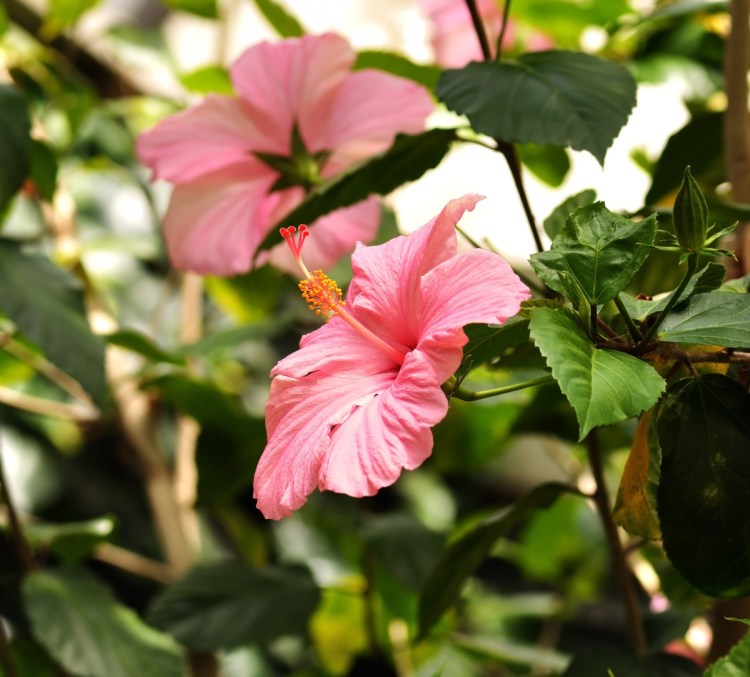Sometimes it’s fun to think outside our zone. How about growing some tropical plants?
Actually, most Maine gardeners already grow tropicals, though you may not know it. We simply call them annuals.
Take, for example, the plant we commonly call a geranium. It isn’t a geranium at all. That name belongs to a native perennial, with the common name cranesbill. Cranesbill is a mounding, long-flowering plant in pinks, purples and blues. The plants that we call geraniums actually have the botanical name of pelargonium, and are Zone 9 perennials native to southern Africa. Other tropical perennials used as annuals in the north include petunias and coleus.
But those plants are so common you don’t get the excitement of cheating your zone to grow something unusual. And most of us want a little excitement on occasion.
A few general rules:
• Don’t put these tropical plants outdoors until mid-June – or about now. They are tropicals and need warm temperatures.
• In southern climates, some of these plants will grow in the shade. But most require at least four to five hours of sunlight in Maine, as the sun isn’t as strong here.
• While you can put these tropicals in the ground, make your life easier by planting them in pots. That way you can bring them inside for the winter, and take them outside again the following spring.

Mandevilla.
My wife Nancy and I have grown a canna for years, putting it on our patio in summer, where it get about four hours of sun each day. Cannas come in a wide variety of colors and prefer fertile, moist soil. Cannas do have blooms but, as with the blooms on your coleus, they aren’t why you grow the plant. It’s the foliage we like, with its huge leaves, often with veins, and attractive leaf stalks. Cannas, and most other tropical plants, require regular watering. After all, it rains a lot in the tropics.
Nancy and I had a friend who planted several tropical hibiscus in her garden every summer – and they bloomed prolifically. There are Maine-hardy hibiscus – the rose of Sharon shrub and mallow perennial. But the tropical versions have large bright flowers; red and pink are most common, but also peach, orange and yellow. The individual blossoms fall off after one or two days of bloom, but the plant itself blossoms all summer long, and the shiny green foliage really stands out.
Tropical hibiscus are sold at many Maine garden centers, sometimes in bush form but also in a tree form. In the latter, they have a single stem that goes about 3 feet tall, so all of the color is above the lower-level plants in the garden.
Mandevilla, a huge vining plant that can grow about 10 feet tall, became trendy about a decade ago. The trumpet-shaped flowers can be pink, red, white or yellow and will start in mid- to late summer and continue until frost. Hummingbirds, butterflies and bees love it. To encourage growth, fertilize it and give it plenty of water, too. It will grow faster if you place it by the south wall of a building for extra heat.
Mandevilla dislikes temperatures below 40, so if you plan to keep it, bring it indoors well before the first frost. Put it in a south-facing window for the winter, and it will keep its leaves and continue growing until you put it out again the following spring.

Bougainvillea.
Bougainvillea is another vine that will do well in small pots, because its roots like to be restricted. While it needs to be moist when first planted, it will bloom better if the soil is slightly dry – so don’t water it daily. Its prolific blossoms are pink to red, and will look better if you have a trellis for the vine, which will not grow quite as tall as mandevilla.
You may want a few palms – just for the huge leaves. Banana trees are an attractive palm to grow on a patio or deck. Some come in a striking red or white. I don’t know if you can grow your own bananas, but it’s worth a try. And if you’re interested in growing fruit, you can also get your own fig tree.
At this point in the column, I must offer an apology. I wrote about agapanthus two weeks ago, before I went shopping for ours.
In past years, we have purchased this delightful tropical at Broadway Gardens and at O’Donal’s. Neither place seems to be stocking them this year. We next looked for them at Skillins, then at Allen, Sterling & Lothrop – and had no luck there, either. So please accept my apology if I created a lust for a plant that you may not be able to buy locally this year.
And if you do find it for sale, please let me know where. Thanks.
ABOUT THE WRITER
TOM ATWELL is a freelance writer gardening in Cape Elizabeth. He can be contacted at: tomatwell@me.com.
Send questions/comments to the editors.


